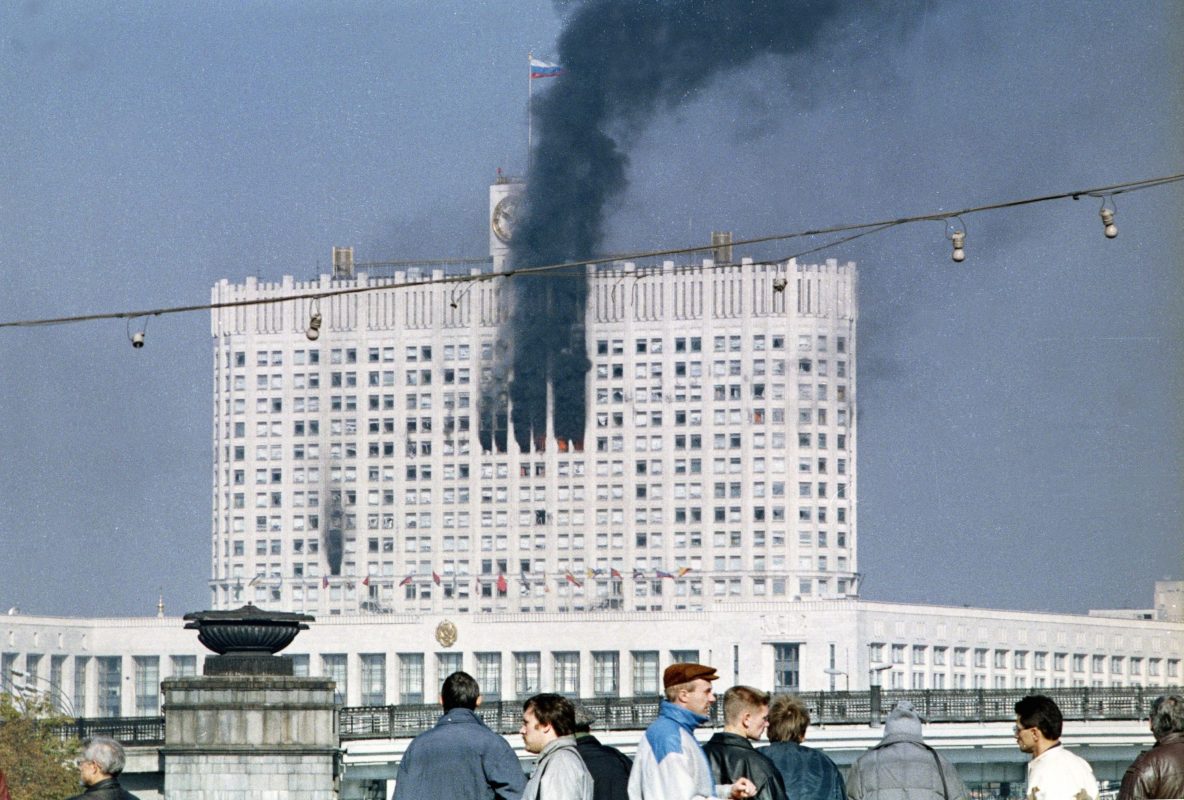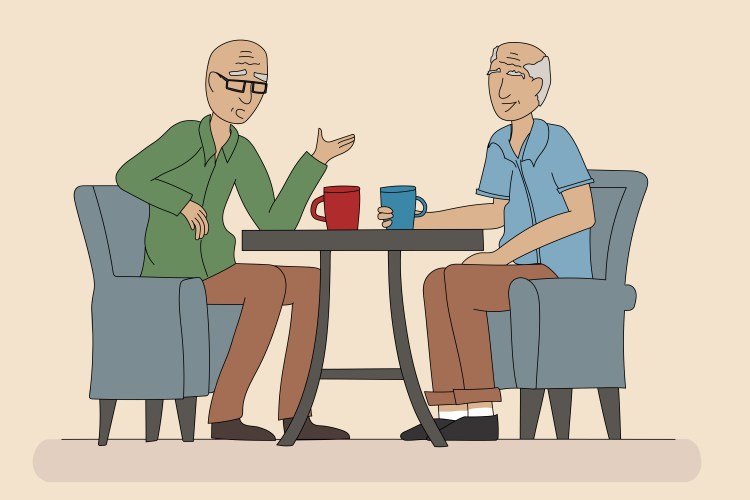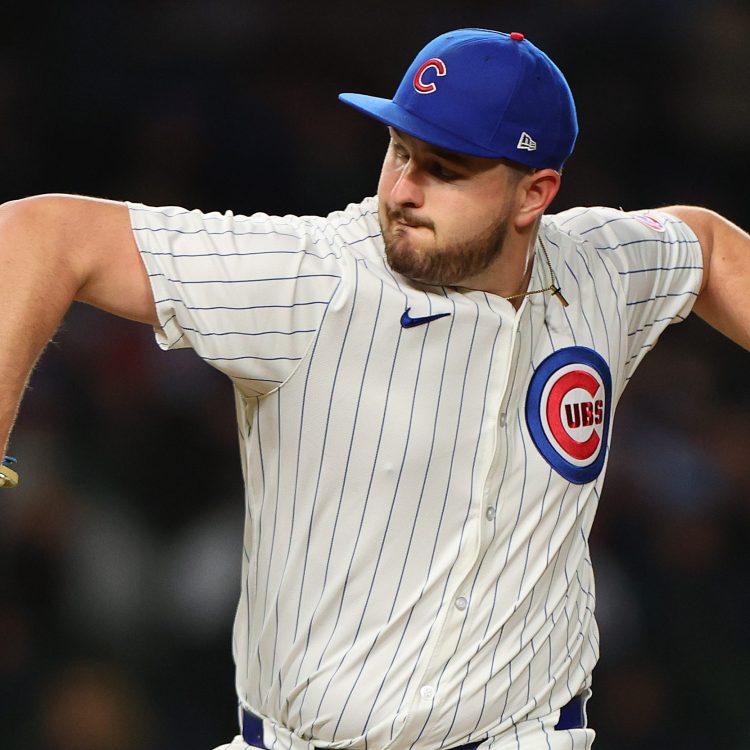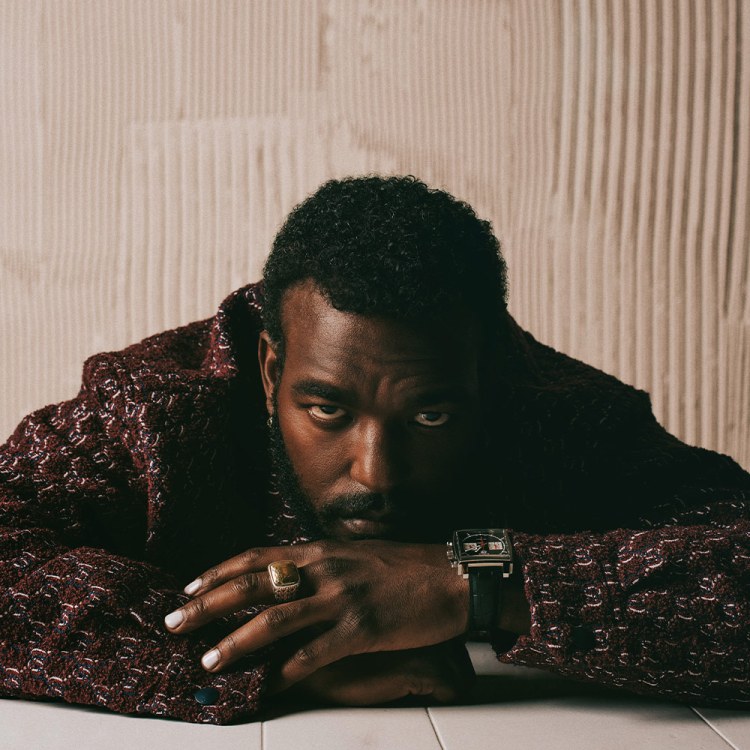“Let’s not talk about Communism. Communism was just an idea, just pie in the sky.” –Boris Yeltsin, 1989
You’re streaming a horror film and the monster “dies” but there’s still 10 minutes left. The obvious conclusion: At least one big showdown remains.
So it goes with modern Russian history too. While the Kremlin flew the flag of the Soviet Union for the last time on Christmas of 1991, the Communist hardliners weren’t dead just yet. Two years later they rose up once more, only to be find themselves quickly overwhelmed. They surrendered on October 4, 1993. Exactly 25 years ago, it seemed that democracy, capitalism and the West in general had triumphed in Russia.
Of course, that wasn’t the case at all. The onetime KGB agent Vladimir Putin has held power since 2000, with no apparent intention of yielding it any time soon. Putin seems to embody much of what his predecessor Boris Yeltsin fought so hard to destroy, making it all the more baffling Yeltsin personally put him in power.
Look back at the moment 25 years ago when Boris Yeltsin seemed to have bested Communism once and for all, as well as why it all slipped away from him.
Playing With a Hand Grenade. Born on February 1, 1931 in Sverdlovsk (now Yekaterinburg), legend has it Yeltsin nearly drowned during his baptism. The priest, who had been drinking moonshine, immersed him in water and got distracted. Other childhood challenges including the state collectivizing the harvest (which meant taking away all the family’s food) and the Nazis invading the Soviet Union when he was 10. “Rather joyless,” Yeltsin wrote of his life decades later. He recalled there were no luxuries of any kind: “Only to survive, to survive and to survive.”
The defining point of his youth may have been when he managed to detonate a hand grenade. Yeltsin was lucky—it only cost him two fingers. In many ways, the rest of his life would follow this pattern. He was fearlessly willing to attempt things others wouldn’t, but often didn’t seem to plan for or even consider the potential consequences of his actions. For all his accomplishments, Yeltsin never really stopped being the boy oblivious to the downsides of messing around with explosives.
Yeltsin joined the Communist Party in 1961 and rose through the ranks. Then he turned his back on it. Yeltsin resigned from party leadership in 1987 and then the Politburo in 1988 and finally the Communist Party itself in 1990. He proved popular first with the people of Moscow and then Russia in general, becoming president of the Russian Soviet Federated Socialist Republic in 1991. This would be the year that brought him global fame and marked the high point of his career.
Crushing the Coup. On August 18, party leaders disturbed by Soviet President Mikhail Gorbachev’s reforms placed him under house arrest. This posed a huge dilemma for the U.S. Should we try to help Gorbachev? How much help should we provide? Was this proof Gorby wasn’t the effective leader we believed him to be? Was it time to put our money on a new horse?
Or rather, it would have been a tough decision had the plotters managed to sustain the effort more than three days. Yeltsin became the face of the resistance when he climbed atop a tank and delivered a speech demanding the release of Gorbachev.
Gorbachev was freed, but his star now paled next to Yeltsin’s. Before the year was out Gorbachev resigned and the Soviet Union splintered.
A Problematic President. A 1991 article by the Los Angeles Times quoted anonymous U.S. officials expressing an array of opinions on Yeltsin. Some were optimistic, feeling Russia would respect their neighbors’ sovereignty in a way the Soviet Union never had: “The most impressive thing about Yeltsin’s brand of Russian nationalism is precisely that it doesn’t seek domination over the other republics.”
Others were less so: “People still have reservations about Yeltsin. He’s shown a great knack for amassing power . . . but no great knack for defining any far-sighted policy goals. Everybody deals with him because he’s there— but would you deal with him if he weren’t in power? No.”
Then there was the wild card: Booze. Reports suggested Yeltsin liked it a little too much. Word had it he once urinated on an airport runway. (Whether or not this happened, it would prove relatively tame compared to future Yeltsin antics.)
Interactions with Yeltsin could indeed be surreal. Witness this 1994 press conference with Bill Clinton that features hysterical laughter unimaginable during the days of Kennedy v. Khrushchev.
But the extent of Yeltsin’s instability had yet to become clear. He seemed truly formidable, particularly once he faced down the Communists again.
The Coup: Take Two. While hardliners had feared the implications of Gorbachev’s actions, in Yeltsin they had someone openly hostile to Communism. When Yeltsin dissolved the Russian legislature on September 21, 1993 and called for general elections, it was too much. Communist leaders barricaded themselves inside the building known as the Russian White House. Indeed, they even “impeached” Yeltsin and appointed a new president.
This revolt lasted longer than 1991’s three days, but not by much. On October 4, tanks assaulted the White House. The rebels surrendered and were arrested. Yeltsin had faced down his opposition again.
And what happened to these plotters? Life in prison? Exile to Siberia? Immediate execution? Answer: Locked up for less than five months. On February 24, 1994, the Russian parliament approved amnesty not only for those coups leaders but also the leaders of the 1991 uprising too.
Popular as he was, Yeltsin was alienating many Russians, including some of his once devoted supporters.
Boris and Broken Faith. A scientist turned parliament member, Mikhail Arutyunov was right by Yeltsin’s side when Yeltsin climbed atop the tank on August 19, 1991. Twenty years later, Arutyunov expressed his disappointment with Yeltsin and in Russia in general to the BBC: “What we have ended up with is what we were fighting against at the time. The population is separating into the extremely poor and the extremely rich. Unfortunately our people have always been very passive except at critical moments.”
It’s safe to say most Russians were frustrated with the old Soviet system. But many came to perceive Yeltsin’s Russia as being even worse, with a handful of well-connected people essentially looting the economy while most struggled to survive. Yeltsin recognized the despair in a 1997 address: “We are stuck halfway, having left the old shore; we keep floundering in a stream of problems which engulf us and prevent us from reaching a new shore.”
Beyond individual impoverishment, there was a growing national feeling of humiliation. The Soviet Union had been a superpower. What were they now? This sense of lost identity was exacerbated when Yeltsin ordered the 1994 invasion of Chechnya, a breakaway republic. It proved a disaster. Despite their military superiority, the Russians simply couldn’t crush the resistance. It’s believed at least 10,000 Russian soldiers died before their forces withdrew. A peace treaty was finally signed in 1997. Yeltsin conceded it “may have been one of my mistakes.”
And in this time of doubt across the land, Yeltsin was hardly conducting himself in a way to inspire confidence.
“The Drunken Czar.” The reports of Yeltsin’s problems with alcohol proved all too accurate. In his 2000 memoir Midnight Diaries, Yeltsin confirmed he had a complicated relationship with intoxicants: “Fairly early on, I concluded that alcohol was the only means to quickly get rid of stress.”
Of course, Yeltsin had long since demonstrated this to much of the planet. During a Washington D.C. visit, he went out to pick up a pizza. Which would have been fine except it was the middle of the night and he was in his underwear. (Happily, he reportedly did get his slices.)
Yeltsin himself described another infamous episode: “I remember that the weight would lift after a few shot glasses. And in that sense of lightness, I felt as if I could conduct an orchestra.” This led to him seizing the baton from the actual conductor and taking over a brass band during a 1994 visit to Germany.
For many, these incidents came to define him. When Yeltsin died in 2007 at 76, Germany’s Der Spiegel published a remembrance titled “The Rise and Fall of the Drunken Czar.”
Indeed, Yeltsin often seemed so unhealthy that the footage below of him “dancing”—to use that term loosely—was believed by some to be a positive thing. While it wasn’t exactly statesmanlike, at least he was functional enough to stay upright while he got his groove on.
Yet the strangest of all his behaviors apparently occurred while he was quite sober. Yeltsin inexplicably anointed as his successor a man who represented so much of what he worked to destroy.
The Puzzling Pick. As the Communist block collapsed, Vladimir Putin did not join the celebrations. A KGB man serving in Dresden, East Germany when the Berlin Wall fell in 1989, he was focused on destroying secret files: “I personally burned a huge quantity of material. We were burning so much stuff that the stove broke down.”
Yeltsin had no respect for these secrets. In 1992, he revealed that the Soviets had imprisoned American servicemen during World War II. And he certainly had no enduring affection for the Communist Party. In 1991, he made a point of essentially banning Communist groups from the government. He wrote in his memoir that he considered banning it altogether.
Making it all the more baffling he would select a man who, on his first day in office, would tell Russian troops their job included “restoring Russia’s honor and dignity.” Strongly implying that those things had been squandered after the fall of the Soviet Union and the rule of Boris Yeltsin.
Yet Putin charmed him. How? Yeltsin wrote: “Unlike other deputies who were always trying to lay out their visions of Russia and the world, Putin did not try to strike up conversations with me… And precisely because of that I wanted to talk to him more.” He also noted that he appreciated how calm Putin always was: “It made me feel that this young man was ready for absolutely anything in life.” He made him prime minister in 1999. Later that year Yeltsin resigned—he wrote in his memoir, “It was only for Russia’s sake that I made that step. A new president was needed. I had to resign”—and Putin took over as president.
And if Yeltsin’s stated reasons strikes you as insufficient grounds for elevating a man in his 40s who didn’t even arrive in Moscow until 1996, you’re not the only one.
Jumped or Pushed? In 2007’s largely scathing “Drunken Czar” article, Der Spiegel observes: “Until his death, Yeltsin never revealed the reasons for the silent coup that was barely concealed by his resignation.” This asserts that Putin and his allies forced Yeltsin out, letting him resign to save face.
That noted, there’s also reason to take Yeltsin at his word. Unquestionably, his health was failing. And Putin has long had a strange knack for charming those who would later turn against him. Sir Richard Dearlove, former chief of Britain’s Secret Intelligence Service, recently acknowledged both supporting Putin’s rise to power and coming to regret that decision. Infamously, President George W. Bush said he looked into Putin’s “soul” and found it surprisingly pleasing, but that didn’t stop them from experiencing increasingly hostile relations.
Putin has remained in power since 2000, occasionally shifting job titles but always staying solidly in control. He has also continued to express affection for Communism, declaring in 2016: “You know that I, like millions of Soviet citizens, over 20 million, was a member of the Communist Party of the USSR and not only was I a member of the party but I worked for almost 20 years for an organization called the Committee for State Security… I was not, as you know, a party member by necessity. I liked Communist and socialist ideas very much and I like them still.”
A Dream Discarded. Democracy in Russia is, at best, on life support. Putin controls the state and pretty much everything else, notably the Russian media. Those who oppose or criticize him invariably wind up dead. Putin was so confident about the most recent election’s outcome he only attended two rallies during the entire campaign.
Russia today is openly hostile to the West, meddling in elections in the United States and throughout Europe. They’ve even conducted a nerve agent attack on British soil, jeopardizing civilian lives in the process. (Traces of the nerve agent were left at both a restaurant and a pub.)
What does Russia have to show for this? Objectively, not much. Russia is a shadow of the Soviet Union at its peak. The economy in particular is a mess. It’s dwarfed by California’s and periodically contracts. (The sanctions imposed in retaliation for their foreign attacks haven’t helped.) Putin’s efforts to raise the retirement age for pensions has inspired public protests. The outrage is unsurprising because Russia is 154th in the world in life expectancy, barely ahead of North Korea. Russians want their money now because they simply may not be alive later.
Yet there is a certain pride again. While Putin is in his own way often as ridiculous as Yeltsin—it’s easy to laugh at someone who genuinely seems to believe he can restore Russian dignity by hanging out with bloated Buddhist Steven Seagal—at least his antics are usually of a decidedly healthier nature.
Looking Back on Boris. Upon Yeltsin’s death 11 years ago, Putin honored his predecessor effusively in a public statement: “We will do everything so that the memory of Boris Nikolayevich Yeltsin, his noble thoughts, and his words ‘protect Russia’ always serve us as moral and political guidelines. A man passed away, thanks to whom a whole new epoch was born. A new democratic Russia was born, a free state open to the world, a state in which power truly belongs to the people.”
Mikhail Gorbachev offered a more complex view on Yeltsin’s death. Which is to be expected—the onetime allies had bitterly fallen out. With Yeltsin’s corpse barely cold, Gorbachev offered praise with an underlying layer of criticism: “I express my deepest condolences to the family of the deceased, on whose shoulders lie many achievements in the service of the country, and serious mistakes.”
This article was featured in the InsideHook newsletter. Sign up now.
























